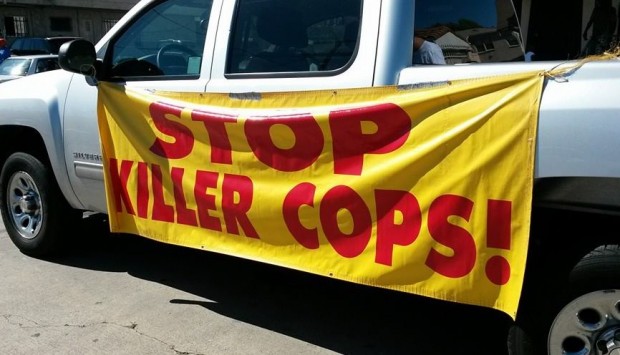 God must need revolutionaries. Last week he called up Gil Scott-Heron, and yesterday, Elmer “Geronimo” Pratt was called home. Pratt was a guy that today’s activists can learn from, because it wasn’t about getting face time on ones local television station or noteriety on the internet. It was about trying to solve the problems he saw in his community. That is why he became a major leader in the Original Black Panthers, and arguably, why the system locked him up for 27 years for a murder he didn’t commit. In the end it took legendary attorney Johnnie Cochran to finally get him exonerated and released, freeing him to live out his final days in the Motherland – and leaving detractors like hatemonger David Horowitz stewing in his own juices about the one that got away from him. Geronimo led a harsh life, but it wasn’t without purpose, and it most certainly not without lessons that we will never forget. And he was so influential to this generation he was even godfather to Tupac Shakur! So rest in peace indeed, brother. This story comes with a never-before-seen video shot by DLJ on Sept. 12, 1997 at that year’s Congressional Black Caucus Conference in Washington, DC during a seminar on police brutality. It was two months after he was released and many people were seeing him for the first time. And he was still fighting.
God must need revolutionaries. Last week he called up Gil Scott-Heron, and yesterday, Elmer “Geronimo” Pratt was called home. Pratt was a guy that today’s activists can learn from, because it wasn’t about getting face time on ones local television station or noteriety on the internet. It was about trying to solve the problems he saw in his community. That is why he became a major leader in the Original Black Panthers, and arguably, why the system locked him up for 27 years for a murder he didn’t commit. In the end it took legendary attorney Johnnie Cochran to finally get him exonerated and released, freeing him to live out his final days in the Motherland – and leaving detractors like hatemonger David Horowitz stewing in his own juices about the one that got away from him. Geronimo led a harsh life, but it wasn’t without purpose, and it most certainly not without lessons that we will never forget. And he was so influential to this generation he was even godfather to Tupac Shakur! So rest in peace indeed, brother. This story comes with a never-before-seen video shot by DLJ on Sept. 12, 1997 at that year’s Congressional Black Caucus Conference in Washington, DC during a seminar on police brutality. It was two months after he was released and many people were seeing him for the first time. And he was still fighting.
Associated Press
Former Black Panther Party leader Elmer “Geronimo” Pratt, whose murder conviction was overturned after he spent 27 years in prison for a crime he maintained he did not commit, died early Friday from a medical ailment, an associate said. He was 63.
Pratt died just after midnight at his home in Imbaseni village, 15 miles from Arusha, Tanzania, where he had lived for at least half a decade, friend and former Black Panther member Pete O’Neal said. O’Neal said he suspects Pratt died of a heart attack or stroke. Pratt was taken to the hospital on Tuesday and Wednesday with high blood pressure.
Pratt was convicted in 1972 of being one of two men who robbed and fatally shot schoolteacher Caroline Olsen on a Santa Monica, Calif., tennis court in December 1968. No one else was arrested.
Pratt claimed he was in Oakland for Black Panther Party meetings the day of the murder, and that FBI agents and police hid and possibly destroyed wiretap evidence that would prove it.
The Black Panther Party was an African-American revolutionary leftist organization, active in the United States from 1966 until 1982. It achieved notoriety through its involvement in the Black Power movement and in U.S. politics of the 1960s and 70s.
Lawyer Stuart Hanlon, who helped Pratt win his freedom, said Pratt refused to carry any resentment about his treatment by the legal system.
“He had no anger, he had no bitterness, he had no desire for revenge. He wanted to resume his life and have children,” Hanlon told The Associated Press from San Francisco on Thursday. “He would never look back.”
Pratt lived a peaceful life in Tanzania that he loved, O’Neal said. Pratt returned from a visit to the U.S. about 10 days ago and remarked that he appreciated the pace of his life in Africa.
“He’s my hero. He was and will continue to be,” O’Neal said. “Geronimo was a symbol of steadfast resistance against all that is considered wrong and improper. His whole life was dedicated to standing in opposition to oppression and exploitation. … He gave all that he had and his life, I believe, struggling, trying to help people lift themselves up.”
Pratt worked with the United African Alliance Community Center in Arusha for the last nine years that he lived in the Tanzanian community, which sits near the base of Mount Kilimanjaro. The organization, which O’Neal founded 20 years ago, works to empower youth.
Pratt’s lawyers, who included high-profile defense attorney Johnnie Cochran, blamed his arrest on a politically charged campaign by J. Edgar Hoover’s FBI against the Black Panthers and other perceived enemies of the U.S. government.
Pratt’s belated reversal of fortune came with the disclosure that a key prosecution witness hid the fact he was an ex-felon and a police informant.
Superior Court Judge Everett Dickey granted him a new trial in June 1997, saying the credibility of prosecution witness Julius Butler who testified that Pratt had confessed to him could have been undermined if the jury had known of his relationship with law enforcement. He was freed later that month.
Cochran, best known representing such clients as O.J. Simpson and Michael Jackson, called the day Pratt’s freedom was secured “the happiest day of my life practicing law.”
Prosecutors announced two years after the conviction was overturned that they would abandon efforts to retry him.
“I feel relieved that the L.A. DA’s office has finally come to their senses in this respect,” Pratt said at the time. “But, I am not relieved in that they did not come clean all the way in exposing their complicity with this frame-up, this 27-year trauma.”
He settled a false imprisonment and civil rights lawsuit against the FBI and city of Los Angeles for $4.5 million in 2000.


More Stories
Muhammad Ali – Rest in Peace
WHITE SUPREMACIST JOYCE WEIGEL DEAD
TYLER COLE, ROT IN HELL!